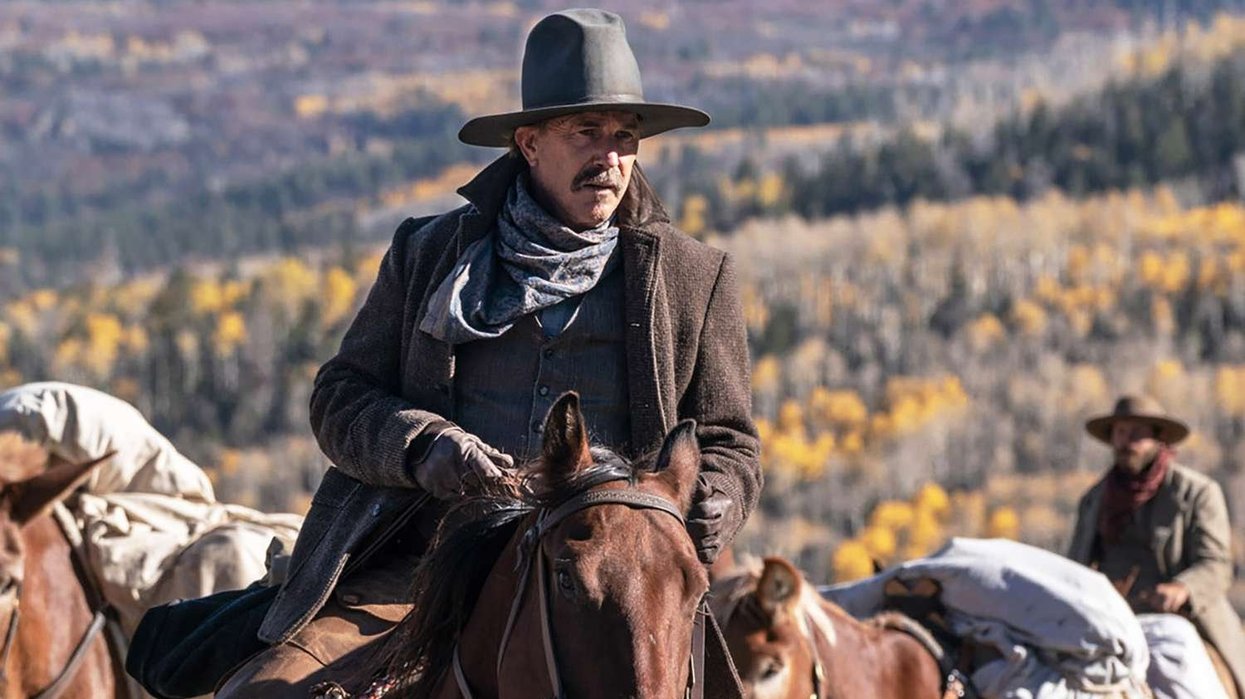
Warner Bros.

Message? We don't need no stinkin' message. The first installment of the old-school Western wisely leaves woke in the dust.
“Wait for it …”
“It’s coming …”
“WAAAIT FORRR ITTT …”
This is what I kept thinking for exactly three hours and thirty seconds watching Kevin Costner’s latest movie, "Horizon: An American Saga — Chapter 1" (yes, it’s that long). But the “IT” never came.
I told a Warner Brothers rep that the only way I could think of to describe it at the time was a Western 'Lord of the Rings.' The size, scope, ambition, and cinematography are off the scale
So. What actually is “IT”?
Before we get into that, I want to take a second and analyze the anatomy of a Hollywood movie. It’s not rocket science. In fact, screenplays follow a structure that’s been used since the dawn of Western society. The Greeks divided storytelling into five parts. They called it a pentalogy: "penta” meaning “five” and “logia” meaning “discourse."
The five-act structure was so effective that it has been copied by some of the greatest storytellers in history. Most of us were introduced to it in high school English class through William Shakespeare. We learned about the five essential stages that make up the anatomy of good stories.
It begins with the exposition. We meet the characters. We learn who we’re going to be cheering for, who the antagonist is, and what the conflict is going to be.
Next is rising action. Our hero faces adversity as conflict rises.
Then the climax: The brave hero uses the tools he’s learned along the way and resolves the conflict.
Next is falling action. An outcome is reached.
And finally, resolution. The conflict is concluded, and the future of our brave hero is clear.
It’s simple. It’s effective. And it has stood the test of time, from the Greeks to Shakespeare.
But this is not how modern Hollywood tells stories any more. Hollywood screenwriters have replaced the entire five-part structure with — as the Critical Drinker likes to call it — the message.
This is the "IT" that I kept waiting on … for over three hours.
How would the message appear this time? Who would be the oppressed? How would that oppressed person, who would probably be a strong-willed female minority who suddenly finds the time to make a very overt pass at her other female co-star, teach all of us schlubs in the theater how inherently evil we all are?
It’s inescapable, and Hollywood doesn't even attempt to hide it any more. The human race has spent thousands of years perfecting the art of good storytelling, and the woke hive mind dismantled that work, relatively speaking, in a matter of minutes.
But occasionally, a good story slips through the cultural Marxist blockade. The “IT” never materialized in "Horizon."
Costner’s movie is, to put it lightly, absolutely epic. I told a Warner Brothers rep that the only way I could think of to describe it at the time was a Western "Lord of the Rings.” The size, scope, ambition, and cinematography are off the scale. And that sometimes is its Achilles' heel.
When you watch "Horizon," you have to keep in mind that it’s basically a three-hour setup movie.
To put it back in terms of the five-step process, it’s an entire movie centered around the exposition. You’re introduced to multiple different stories that at first seem to have no real connection. But little by little, you begin to see what Costner is weaving.
I’d call it a slow burn, spread out over four eventual sequels (yep — that’s how epic this is going to be). To be fair, it’s not altogether slow. The action sequences are intense. But, I mean, come on — it’s a three-hour movie. Peaks and valleys are to be expected, but I think Costner could have shortened the movie up and trimmed a few valleys.
I can’t speak enough on the cinematography of this film. The old West explodes before your eyes in a way that I don’t think has ever been done with a Western. You’re not going to watch as a wagon train rolls by and spreads dust all over the air; you’re going to taste the dirt in your mouth and wipe it from your eyes.
But even through all of that, the most refreshing part of "Horizon" is the absence of that "IT.” The pioneers and cowboys are not represented as the epitome of white colonial rage and evil. The Native Americans are not cast as ravenous savages.
The movie makes it abundantly clear: Life in this fledgling country was brutal for everyone. Hard men and women on all sides fought and died for it. And the action sequences pull zero punches on the brutality.
But human beings are not mere caricatures of extreme good and evil. "Horizon" clearly makes an effort to showcase the duality of the human spirit. Cowboys and pioneers killed Indians and, often, each other. Indians killed settlers. They fought and killed other tribes. Costner’s epic story shows all of this in devastating detail, but it also immediately follows that up with the other side of the coin. Whichever end of the rifle, revolver, or knife, no one on either side is a simplistic, Hollywood-style "good guy" or "bad guy."
So far, Costner seems committed to a non-woke depiction of the harsh, unforgiving era that was the staging point for the greatest country this planet has ever known. Founding it wasn’t easy for anyone. It was hard for the pioneers. It was hard for the Native Americans. But for all who rose to the challenge, destiny awaited — just beyond the horizon.
Editor's note: For Christian Toto's review of "Horizon," see here.
Jason Buttrill